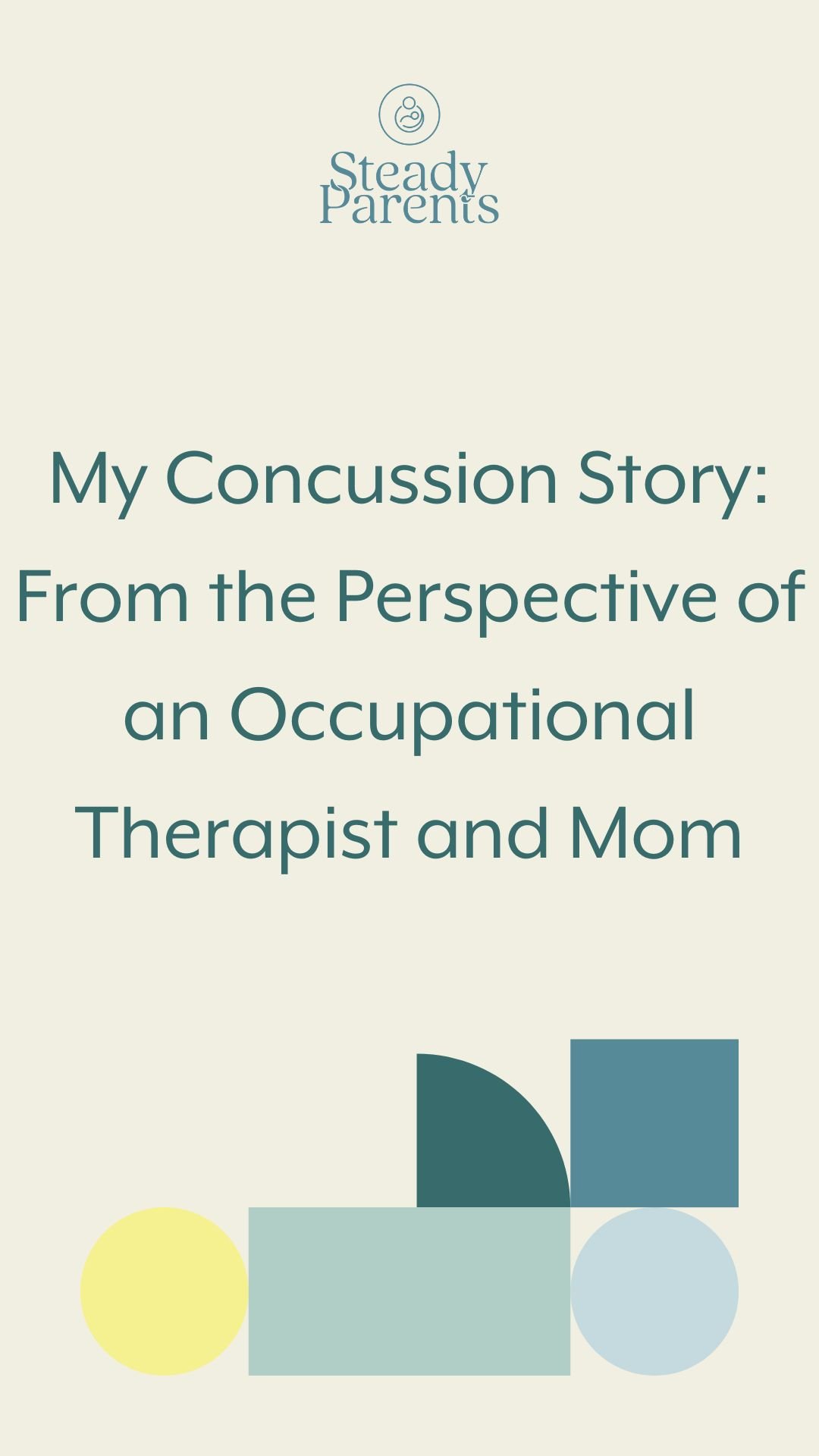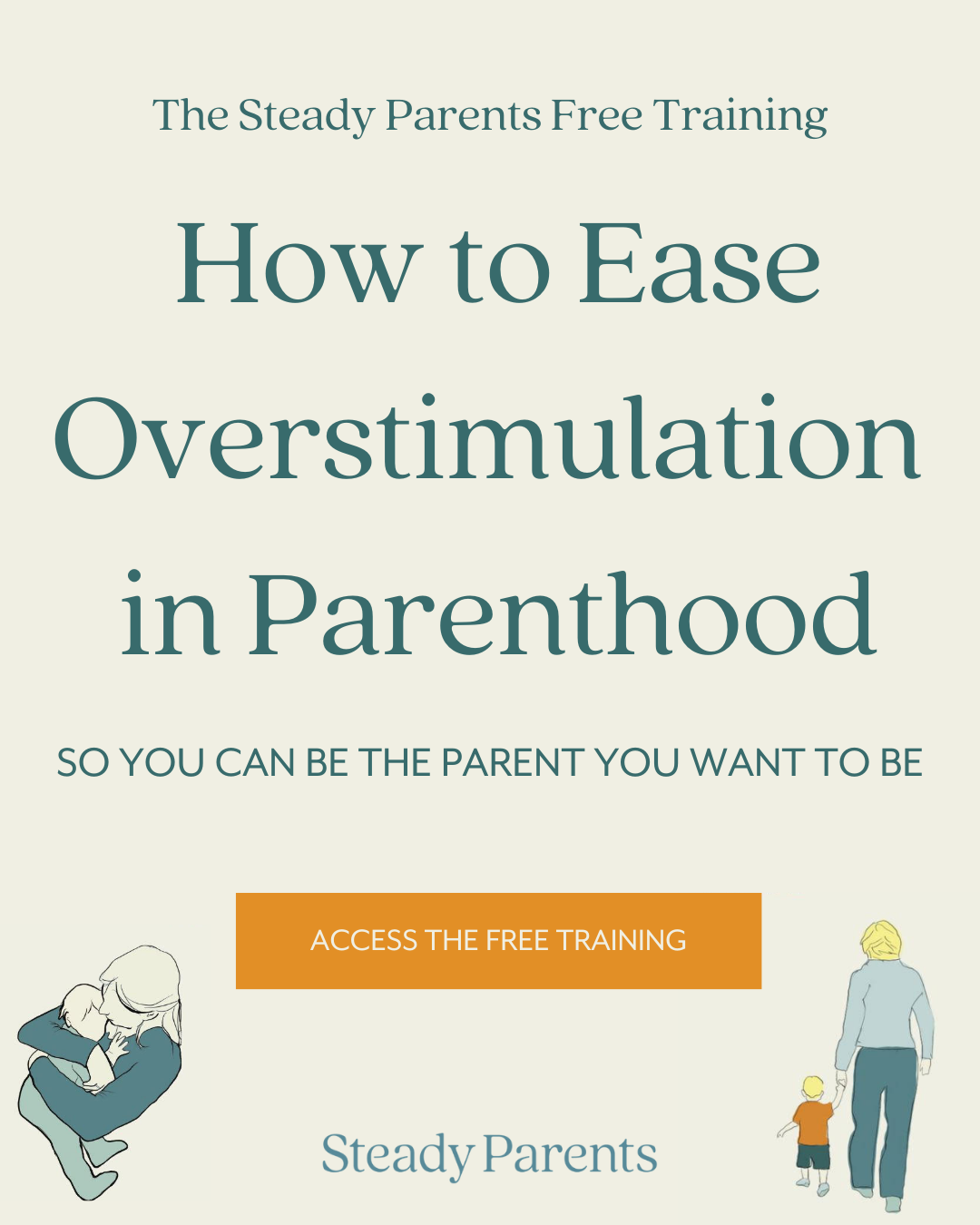Traumatic Brain Injury and Sensory Overload: My Concussion Story
March is Brain Injury Awareness Month and in order to shed more light on the experiences of those who have suffered from a TBI, or traumatic brain injury, I want to share my story with my concussions and how it has affected my sensory processing into parenthood.
If you prefer to listen to my story, I was recently on the Experience Motherhood podcast with therapist Elisabeth Emmerich.
My Concussion Story- From the Perspective of an Occupational Therapist and Mom
Last September marked four years since my first of a series of concussions. The big one that shifted everything.
I was out for a hike when I fell and hit my head. I got a concussion that led to debilitating sensory overload.
I had an 18-month old at the time and it took everything in my power not to want to just shut the world out so I could heal.
I ended up using all of my occupational therapy knowledge on myself just to survive parenthood.
The doctors told me to just go lay in a dark room for a few days and I would be fine. But I wasn’t fine.
I had to advocate for myself and see a traumatic brain injury specialist to really rehab my brain and reduce the sensory overload that was consuming my life. It’s almost impossible to do this alone!
I applied personalized sensory strategies based on my unique needs.
So while I don’t offer these kinds of one-on-one treatments anymore, if you need advice or coaching after a brain injury or sensory overload, I am here.
I’ve made so much progress, I barely even think about my concussions as they relate to my day-to-day life anymore. But as the anniversary approached, I found myself getting a little uncomfortable.
It wasn’t until my friend told me, “You’re so calm right now,” that I realized I wasn’t calm. I was dissociated.
One trigger later, I got mad. Like, MAD mad.
Every emotion I hadn’t been feeling one week prior, it all came pouring out of me, and every sensation I hadn’t been registering, they all came rushing into me.
It was like someone had taken sandpaper and rubbed my skin raw.
And I stayed like that for about a week. I was living in survival mode with no real internal connection to my world.
Then, slowly, slowly, slowly, I started coming out of it.
I had tiny moments of engagement in my life. A hug here. A smile there…
Little micro-moments to show me that I was healing- again.
So this year, I was right. I was prepared for it, although not in the way I thought I was.
What I was prepared for was accepting the intensity of the trauma as it crashed over me, and letting it slide right back out without grasping to it and wondering what it means for myself as a whole.
These moments, these seasons of dysregulation, trauma, survival mode… they come. Sometimes with warning, sometimes without warning. But they’re never permanent.
And those little micromoments of connection are pockets of oxygen in an otherwise suffocating season.
As I recovered, I built this business to offer actionable, brain-centered solutions to burnt-out and overstimulated parents. 😵💫
I’m living proof that sensory-based strategies work. And I’m so glad you’re here so I can share them with you.
If you’re ready to do the same, whether you have suffered a traumatic brain injury or not, join my course Sensing Your Needs in Parenthood so you can get started with increasing connection and playfulness, reducing overstimulation in parenting, as fast as this week!
So now that you’ve heard my story, let’s get into the WHY behind why I was feeling what I was feeling after my concussions and some quick strategies you can implement to reduce
“Little micro-moments to show me that I was healing- again”
What is a TBI (traumatic brain injury)?
A traumatic brain injury (TBI) is a disruption in normal brain function caused by a blow, bump, or jolt to the head or a penetrating head injury. TBIs range from mild to severe and can result in a wide range of physical, cognitive, and sensory symptoms (NIH, 2023).
What are the three types of TBI?
Mild TBI
Also known as a concussion, a mild TBI typically involves temporary dysfunction of brain cells. Symptoms may include headache, confusion, dizziness, and sensitivity to light or sound.
Moderate TBI
This type of TBI involves a more significant disruption of brain function, leading to prolonged symptoms and potential cognitive impairments.
Severe TBI
Severe TBIs result in extensive damage to brain tissue, often causing long-term disabilities and cognitive deficits.
Concussion vs. Mild TBI
The terms "concussion" and "mild TBI" are often used interchangeably, referring to a mild form of traumatic brain injury.
Concussions typically resolve within a few days to weeks, but some individuals may experience persistent symptoms requiring specialized treatment.
As was the case in my situation, I required extensive treatment to feel like myself again.
Can TBI Cause Sensory Overload?
Yes, traumatic brain injuries, including concussions, can lead to sensory overload.
Sensory overload occurs when the brain receives an overwhelming amount of sensory input that it struggles to process effectively. This can manifest as heightened sensitivity to light, sound, touch, or smell, resulting in discomfort, anxiety, and emotional dysregulation.
Symptoms of Sensory Overload Caused by a Concussion
Some of the most common symptoms people experience after a concussion related to sensory overload include:
Hypersensitivity to light (photophobia) and sound (phonophobia)
Increased sensitivity to touch, textures, and clothing
Heightened sense of smell (hyperosmia)
Difficulty filtering background noise or focusing on conversations
Emotional dysregulation, including irritability, anxiety, or meltdowns
Let’s dive a bit deeper into some of the symptoms and how it can effect parents with young children on an even deeper level.
TBI and Impulse Control
Traumatic brain injuries can impact impulse control, leading to impulsivity, poor decision-making, and difficulty regulating emotions and behaviors.
This can affect daily functioning and interpersonal relationships, requiring strategies to improve self-control and emotional regulation.
You know how earlier I mentioned I got MAD at my family. Yelling and having a a full-on tantrum is not in my normal character. But because my concussion was affecting my impulse control, I had no choice but to snap!
Repair is a critical part of parenting, so once I explained to my husband and kids why I acted the way I did, the feelings I was experiencing and the lack of control I had over my actions, all was forgiven.
TBI and Executive Function
Executive function refers to a set of cognitive skills responsible for planning, organizing, problem-solving, and self-regulation. TBIs, especially those affecting the frontal lobe of the brain, can disrupt executive function, leading to difficulties in goal-directed behavior, time management, and cognitive flexibility.
I was constantly running late in the early healing stages after my concussion. Everything just seemed to take longer than I expected and the change in my executive functioning is the reason!
TBI and Memory Loss
Memory impairment is a common consequence of traumatic brain injuries, particularly in cases of moderate to severe TBI. This may include difficulties with short-term memory, long-term memory retrieval, and forming new memories.
Strategies such as memory aids, routines, and cognitive rehabilitation can support memory function post-injury.
TBI and Sleep
Sleep disturbances are prevalent among individuals recovering from TBIs. Symptoms may include insomnia, hypersomnia (excessive daytime sleepiness), fragmented sleep, nightmares, and sleep-related breathing disorders.
Addressing sleep hygiene, implementing relaxation techniques, and consulting with healthcare providers can improve sleep quality post-TBI.
You guys know how passionate I am about getting quality sleep! It is possible, even in those little kid years. I share a few sleep strategies in my recent blog post.
TBI and Mental Health
Traumatic brain injuries can impact mental health, contributing to conditions such as depression, anxiety, post-traumatic stress disorder (PTSD), and mood disorders.
When you’re not getting good quality sleep and feel like you are failing as a mother, this can aggravate your mental health symptoms even more!
Comprehensive treatment approaches, including therapy, medication, and lifestyle interventions, are essential for addressing mental health concerns in individuals with TBIs.
TBI and ADHD
There is a potential overlap between symptoms of traumatic brain injury and attention-deficit/hyperactivity disorder (ADHD). Both conditions can involve difficulties with attention, concentration, impulse control, and executive function.
A thorough assessment by healthcare professionals is necessary to differentiate between TBI-related symptoms and underlying ADHD.
Brain Injury and Sensory Overload
Sensory overload is a common experience for individuals recovering from brain injuries. Environmental stimuli, such as bright lights, loud noises, crowded spaces, and unfamiliar textures, can exacerbate sensory sensitivities and trigger overwhelming responses.
Creating sensory-friendly environments, using adaptive equipment, and practicing sensory regulation techniques can help manage sensory overload post-injury.
Brain Injury and Sense of Smell
Changes in the sense of smell, known as olfactory dysfunction, can occur following traumatic brain injuries. This may include reduced ability to detect odors (hyposmia), distorted perception of smells, or heightened sensitivity to certain scents (hyperosmia). Olfactory training, sensory integration therapy, and environmental modifications can support olfactory recovery and adaptation.
Strategies for Sensory Overload After Concussion
Sensory Diet
Develop a personalized sensory diet incorporating activities and stimuli that regulate sensory input. This may include sensory-rich experiences, calming techniques, and sensory breaks throughout the day.
Environmental Modifications
Create a sensory-friendly environment by reducing sensory triggers such as bright lights, loud noises, cluttered spaces, and overwhelming textures. Use soft lighting, noise-canceling headphones, comfortable seating, and soothing colors to promote relaxation and reduce sensory overload.
Sensory Tools
Use sensory tools and aids to modulate sensory input and promote self-regulation. Examples include weighted blankets, fidget toys, sensory-friendly clothing, aromatherapy, and tactile stimulators.
Mindfulness and Relaxation Techniques
Practice mindfulness, deep breathing, progressive muscle relaxation, and guided imagery to manage stress, anxiety, and sensory dysregulation. Incorporate relaxation exercises into daily routines to promote calmness and emotional stability.
Communication and Advocacy
Communicate your sensory needs and challenges to family members, caregivers, educators, and healthcare providers. Advocate for accommodations, modifications, and support services that facilitate sensory regulation and enhance quality of life post-concussion.
This is my number one recommendation! Find a concussion specialist that will give you good advice and strategies to help heal your brain and nervous system, not just tell you to wait it out.
In conclusion, traumatic brain injuries, including concussions, can have profound effects on sensory processing, cognitive function, emotional regulation, and overall well-being.
Understanding the impact of TBIs on sensory overload and implementing targeted strategies and interventions are crucial for promoting recovery, enhancing quality of life, and supporting individuals in their journey of healing and adaptation.
Pin this for Later:









